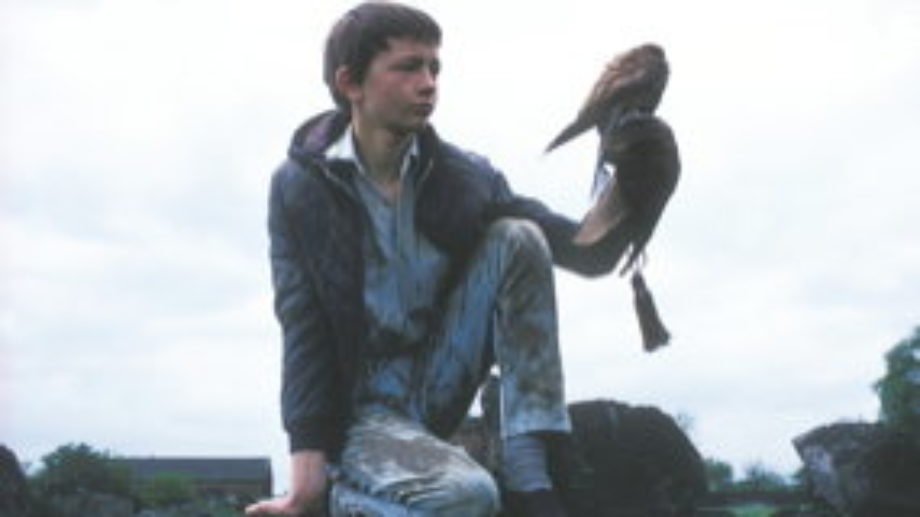
On Tuesday we will continue our weekly celebration of “50 Years of The New York Film Festival” with a new 35mm print of Ken Loach's seminal film Kes, originally screened at the eighth NYFF in 1970.
Kes, Loach’s second feature as director, tells the story of a bullied, directionless 15-year-old boy named Billy (David Bradley) who dreams of escaping an inevitably bleak future in his poor coal mining town. Universally hailed as the sleeper of the year when it was making the festival circuit in 1970, Kes is as pertinent today as it was 42 years ago. “At least one in five young people now are neither in education nor have work,” says Loach looking back on the continuing power and relevance of his film. “The community (Billy) grew up in was destroyed by Margaret Thatcher’s government when the mines were shut down, and I know this situation is now the same throughout Europe and the western world. It’s time we got organized on behalf of all the Billy Caspers.”
Having just received an extended run from BFI as part of a two-month exhbition of Loach's work, Time Out London writes: “Kes is one of the most astute, engaged films about education and what it takes for kids to be excited about learning or passionate about anything, really, whether in the classroom or roaming the fields with a feathered friend.”
Chris Drake for Film Comment adds: “Kes remains one of Loach’s best-loved films . . . His hallmark traits of effortless naturalism and unpatronizing attention to working-class lives are on show here, fully formed and deeply affecting. The extraordinary performance of the nonprofessional Bradley as Billy is the film’s heart: he’s simultaneously as earnest, lively, and distracted as any 14-year-old but also resourceful and completely aware of his hopeless circumstances.”
“50 Years of the New York Film Festival” will continue on Tuesday, December 6th (and every Tuesday after that) with Gleb Panfilov’s delightfully wry The Debut, from the ninth edition of the festival in 1971.
Here is a list of all the films that played the eighth New York Film Festival in 1970:
The Wild Child (L’enfant sauvage)
François Truffaut, France, 1969
Shown with “What Did You Think Of The Movie?” Jeremy Paul Kagan, USA
Wind From The East (Vent de l’est)
Jean-Luc Godard, Italy/France/West Germany, 1969
Shown with The Giants, Gene Deitch, Czechoslovakia
Five Easy Pieces
Bob Rafelson, USA, 1970
Shown with Arena, Istvan Ventilla, USA
Zorns Lemma
Hollis Frampton, USA, 1970
Shown with Double Pieces, Scorpio Rising, Dick Fontaine, Great Britain, 1970
Othon (Les yeux ne veulent pas en tout temps se fermer, ou Peut-étre qu’un jour Rome se permettra de choisir à son tour)
Jean-Marie-Straub and Danièle Huillett, West Germany, 1970
Shown with Reunion, Gerry Matthews and Ton Scheur, USA
The Butcher (Le boucher)
Claude Chabrol, France, Italy, 1969
Shown with Henry 9 ‘til 5, Bob Godfey, Great Britain
Comrades (Camarades)
Marin Karmitz , France, 1970
Shown with Making ‘Love’, Finbar Harvey, USA
A Story From Chikamatzu (Chikamatzu Monogatari)
Kenji Mizoguchi, Japan, 1954
Shown with The Magic Machines, Bob Curtis USA
Mistreatment (Misshandlingen)
Lasse Forsberg, Sweden, 1970
Shown with The-End-Of-One, Paul Kocela, USA
Kes
Ken Loach, Great Britain, 1969
Shown with Hands, Knees And Bumps-A-Daisy, George Dunning, Great Britian
Street Scenes
Martin Scorsese, USA, 1970
Shown with The Golden Positions, James Broughton, USA
Je t’aime, je t’aime
Alain Resnais, France, 1968
Shown with Invasion, Stefan Schabenbeck, Poland
The Inheritors (Os herdeiros)
Carlos Diegos, Brazil, 1969
La Musica,
Paul Seban, France, 1966
Shown with Subterraneans, Roberto Castro, France
Une simple histoire
Marcel Hanoun, France, 1958
Shown with Kyoto, Kon Ichikawa, Japan
Even Dwarfs Started Small (Auch zwerge haben klein angefangen),
Werner Herzog, West Germany, 1970
Shown with The Want Ad, Bernd Upnmoor, Germany
The Spider’s Strategem (Strategia del ragno)
Bernardo Bertolucci, Italy, 1969/70
Shown with The Battle, Derek Phillips, Great Britain
Harry Munter
Kjell Grede, Sweden, 1970
Shown with Three Days, Phillip Frey, USA
The Garden Of Delights (El jardin de las delicias)
Carlos Saura, Spain, 1979
Shown with Even the Sun Cries, François Bel, France
The Conformist (Il conformista)
Bernardo Bertolucci, Italy/ France/ West Germany, 1970
From Lumière To Langlois: The French Silent Cinema
Excerpts from French silent films with piano accompaniment by Arthur Kleiner
Shown with Langlois, Eila Hershon USA
Days And Nights In The Forest (Aranyer Din Ratri)
Satyajit Ray, India, 1969
The Cannibals (I cannibali)
Liliana Cavani, Italy, 1970
Shown with Bleu Shut, Robert Nelson, USA
Praise Marx And Pass The Ammunition
Maurice Hatton, Great Britain, 1968
Shown with Richard Hamilton, James M. Scott, Great Britain
The Scavengers (I recuperanti)
Ermanno Olmi, Italy, 1976
Shown with P.B.L. #2, Robert Breer, USA
Luis Buñuel, Italy/ France/ Spain, 1970
Shown with Visages de femmes, Peter Foldes, France
Special Events:
“1927 – 1933: Medium Rare – Films from the end of the silent film and 1933” (with AFI)
“American Voices,” a survey of films by and about minority groups in America (with MoMA)
“Cinema and Color,” a survey of colored films using all processes (with Cinémathèque Française)
Photo courtesy of the Kobal Collection



